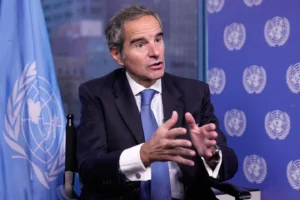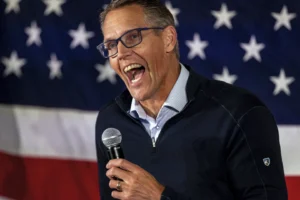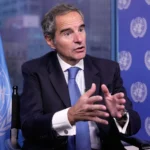In Meeting with Governors, Biden Touts Trillions in Federal Spending Heading to States
With his legislative agenda stalled in a divided Congress, the president focuses on implementing existing programs
- Published In: Politics
- Last Updated: Feb 11, 2023
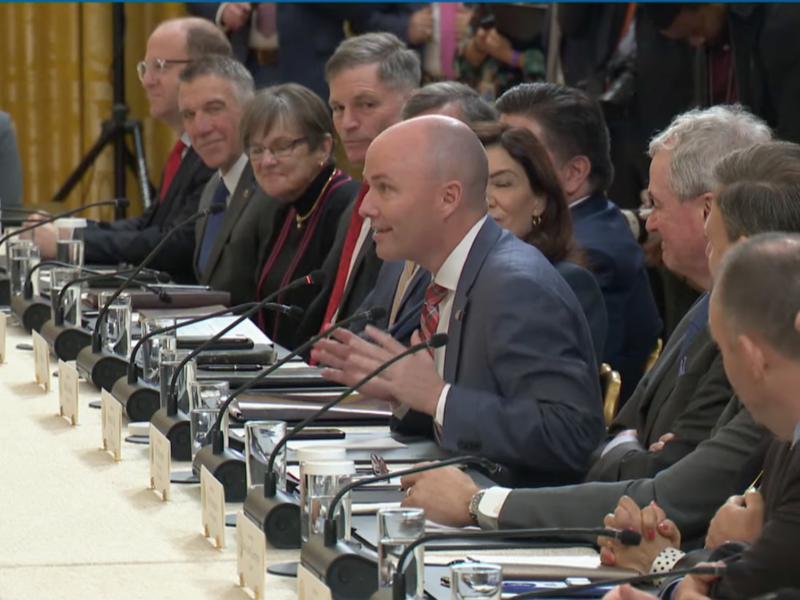
Wyoming Gov. Mark Gordon, seen left-of-center behind Utah Gov. Spencer Cox, participated in a meeting with President Joe Biden at the White House on Friday. (Photo via YouTube / the White House)
By Jacob Gardenswartz
Special to the Wyoming Truth
WASHINGTON — Wyoming Gov. Mark Gordon joined 36 other U.S. state and territory leaders for a meeting with President Joe Biden and key members of his administration at the White House on Friday, as the president seeks to demonstrate his commitment to bipartisanship in an era of hyper-politicization.
With Republicans now maintaining narrow control of the U.S. House, Biden’s legislative agenda is all but dead in the water. As such, the president sought to emphasize the need to implement the sweeping measures that have already been signed into law, a tacit acknowledgement that further Congressional action is unlikely.
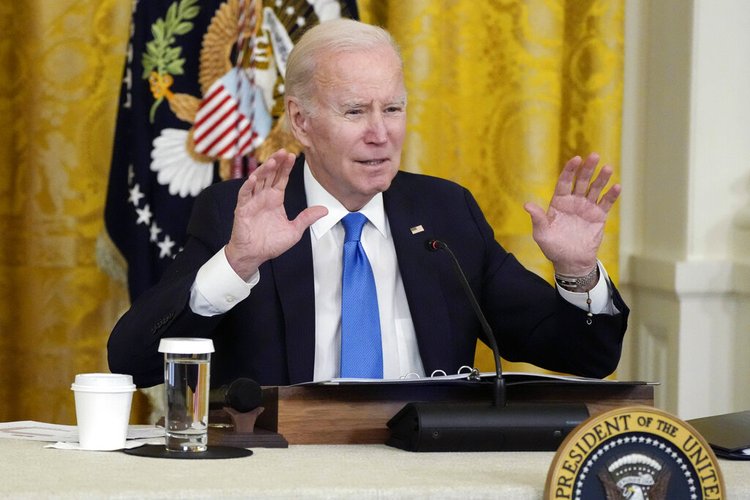
“I think the success for all of us, Democrats and Republicans, in part can be measured by not what else we get done or passed, but whether we’re able to implement what we’ve already done,” Biden said in introductory remarks in the East Room.
“I know it’s a problem to deal with all the money we’re sending you” Biden joked.
Since Biden took office two years ago, his administration and Congress have approved nearly $5 trillion in new federal spending, from COVID-19 relief measures such as the American Rescue Plan Act to infrastructure investments like the Bipartisan Infrastructure Law to energy and health care measures included in the Inflation Reduction Act.
“We have, in a sense, a little almost too much to work with,” Biden said. “Because we got a lot to get done that we’ve already passed.”
The president highlighted the bipartisan nature of many of those initiatives, crediting some of the governors in the room for helping him usher those provisions through the Congress. Without them, “we would not have a $1.2 trillion infrastructure bill,” Biden said. “That was a bipartisan initiative, real, with many governors helping us push it over the line.”
In recent weeks, the White House released specific breakdowns outlining how much money each U.S. state and territory is receiving as a result of those actions. According to White House figures, Wyoming has already been allocated upwards of $2.3 billion from the Bipartisan Infrastructure Law, including significant investments in transportation, clean water and broadband internet access.
And yet, Wyoming’s political leaders — Gordon among them — often serve as top critics of the Biden administration, at times denouncing some of the very same spending flowing into the state’s coffers.
In Congress, Wyoming’s Republican Sens. John Barrasso and Cynthia Lummis on Friday introduced a resolution proposing a constitutional amendment that would force the president and legislators to enact a balanced budget and cap federal spending to below 18% gross domestic product.
“This amendment ensures Congress and the president are constitutionally obligated to avoid reckless overspending,” Barrasso said in a statement. “At a time [when] we are facing record-high inflation, it’s more important than ever to balance each and every budget coming out of Washington.”
Rep. Harriet Hageman (R-Wyo.), meanwhile, signed onto legislation to repeal the Inflation Reduction Act, and has openly criticized Republican lawmakers who supported the $1.7 trillion 2023 government funding package passed late last year, something she decried as a “monstrosity.”
“We have put the Senate on notice that if you’re going to send that kind of nonsense to us, it’s D-O-A — dead on arrival,” she said during a town hall event in Casper last month.
In his remarks to governors, Biden referenced calls to cut spending, placing the blame for the burgeoning federal debt on the previous administration while arguing his policies have brought about deficit reduction. And as congressional Republicans continue to assert they won’t vote to raise the debt ceiling without additional spending cuts, Biden stressed his belief that those lawmakers aren’t “serious” about “holding the debt hostage” to force such reductions.
“I believe we can be fiscally responsible without threatening our country or dealing with chaos,” Biden said.
Gordon, for his part, has toed a thin line. He’s joined red-state governors in critiques and legal challenges to the Biden administration, authorizing the state to sign onto several lawsuits against federal agencies concerning vaccine mandates, immigration policies and oil and gas lease sales, among others.
But he’s also touted the federal funding being sent his way. In a series of letters to state legislators with his supplemental budget proposals last year, Gordon decried the Biden administration’s “myopic energy policies,” but also highlighted the “millions of dollars of federal funding” allocated to the state, which he noted can be used “to try and address some challenges Wyoming has faced for many years.”
One such challenge includes Wyoming’s suicide rate, the highest in the nation. In his Friday remarks, Biden noted recent federal investments in mental health, among them an additional $500 million earmarked in the 2023 spending bill for the 988 Suicide and Crisis Lifeline. Such challenges are especially prevalent in a post-COVID environment, Biden said, when there are “an awful lot of empty chairs at that dining room table being stared at.”
Lawmakers in the Equality State are considering a measure to establish a trust fund to finance around-the-clock staffing of the crisis hotline, though they declined to fund that effort for now. In a statement last year, Gordon touted the expansion of the hotline throughout the state as a “critical and free service for those who need it.”
But during the public portion of Friday’s meeting, Gordon remained silent, sharing neither praise nor critique of the Biden administration. His office did not respond to multiple requests for comment on his private conversations with the president.




